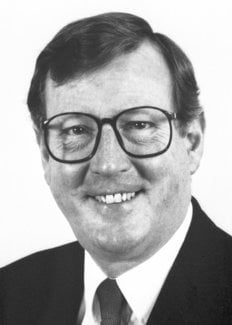David Trimble
Biographical

David Trimble was born in Bangor, Northern Ireland on 15 October 1944. He was educated at Bangor Grammar School, and graduated from Queen’s University, Belfast in 1968 with a first-class honours degree in Law.
He was called to the Northern Ireland Bar in 1969, and, in the same year, became a lecturer in Law at Queen’s University, Belfast. He was made Senior Lecturer in 1977, and, between 1981 and 1989, was Head of Department, Commercial and Property Law.
He married Daphne Elizabeth, nee Orr, in 1978, and they have four children: Richard (22 March 1982), Victoria (5 April 1984), Nicholas (18 December 1986) and Sarah (2 April 1992).
He entered politics in 1975, representing (on behalf of the Vanguard Unionist Party) South Belfast in the Northern Ireland Convention, 1975-76.
Mr Trimble then joined the Ulster Unionist Party. He was Vice-Chairman of Lagan Valley Unionist Association in 1983-85, becoming Chairman in 1985. In 1990-1996, he was Honorary Secretary of the Ulster Unionist Council and, in 1989-95, Chairman of the UUP Legal Committee.
In 1990, he was elected MP at Westminster for Upper Bann Constituency, and still holds that seat today. He was elected Leader of the Ulster Unionist Party on 8 September 1995.
On 1 May 1997, the Ulster Unionist Party gained over 33 per cent of the vote in Northern Ireland, holding 10 of the 18 seats in Parliament.
Mr Trimble had been included in the UUP delegation in all-party talks in the early 1990s.
In 1996, he led the UUP negotiating team into another round of talks arranged by the United Kingdom and Irish governments. These eventually proved successful, the Belfast Agreement being concluded at Castle Buildings, Stormont on Friday, 10 April 1998.
On 22 May 1998, the Agreement was approved by 71 per cent in Northern Ireland (in a separate referendum in the Republic of Ireland, 94 per cent voted to remove the territorial claim from the Irish constitution).
On 25 June 1998, Mr Trimble was elected an Assembly Member for Upper Bann. The UUP, with 28 of the 108 seats, is the largest party. On 1 July 1998, he was elected First Minister (Designate) in the New Northern Ireland Assembly.
He is now charged, with the deputy First Minister (Designate), with implementing the Belfast Agreement. This involves creating an Executive Committee, responsible to the Assembly, though Mr Trimble and his party are insistent that the Irish Republican Army (IRA) will have to start decommissioning illegally held weapons before Sinn Féin is included in any such body.
Mr Trimble is also jointly charged with establishing a North-South Ministerial Council, linking both parts of Ireland, and a British-Irish Council, linking the two governments and other administrations in these islands. Mr Trimble was: Founder Chairman of the Ulster Society, 1985-1990; Chairman, Lisburn Ulster Club 1985-1996; Member of the Devolution Group, 1979-1984. He has succeeded in championing the Ulster Unionist cause internationally (helping establish a UUP office in Washington, DC in 1995); he is also President of the Unionist Information Office established in London in 1996.
His personal interests are classical music, opera, history and reading.
David Trimble died on 25 July 2022.
This autobiography/biography was written at the time of the award and later published in the book series Les Prix Nobel/ Nobel Lectures/The Nobel Prizes. The information is sometimes updated with an addendum submitted by the Laureate.
Nobel Prizes and laureates
See them all presented here.
